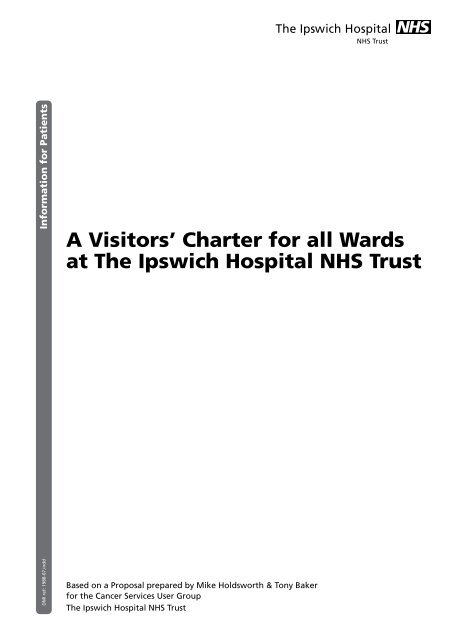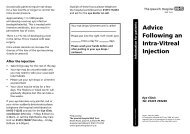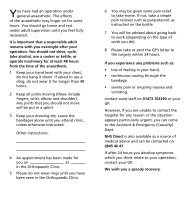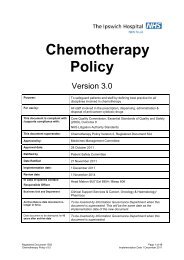A Visitors' Charter for all Wards at The Ipswich Hospital NHS Trust
A Visitors' Charter for all Wards at The Ipswich Hospital NHS Trust
A Visitors' Charter for all Wards at The Ipswich Hospital NHS Trust
You also want an ePaper? Increase the reach of your titles
YUMPU automatically turns print PDFs into web optimized ePapers that Google loves.
In<strong>for</strong>m<strong>at</strong>ion <strong>for</strong> P<strong>at</strong>ientsA Visitors’ <strong>Charter</strong> <strong>for</strong> <strong>all</strong> <strong>Wards</strong><strong>at</strong> <strong>The</strong> <strong>Ipswich</strong> <strong>Hospital</strong> <strong>NHS</strong> <strong>Trust</strong>DMI ref: 1988-07.inddBased on a Proposal prepared by Mike Holdsworth & Tony Baker<strong>for</strong> the Cancer Services User Group<strong>The</strong> <strong>Ipswich</strong> <strong>Hospital</strong> <strong>NHS</strong> <strong>Trust</strong>
Contents:Why is a Visitor’s <strong>Charter</strong> considered necessary?<strong>The</strong> <strong>Ipswich</strong> <strong>Hospital</strong> Ward Visitor PolicyStakeholders in a Visitor’s <strong>Charter</strong>Wh<strong>at</strong> is the aim of a Visitor’s <strong>Charter</strong> ?Wh<strong>at</strong> will the Visitor’s <strong>Charter</strong> achieve?Scope of this Visitor’s <strong>Charter</strong>Points covered in this Visitor’s <strong>Charter</strong>:• Hygiene• Food & drink brought in by visitors• Numbers of visitors and length of visits• Respect <strong>for</strong> the p<strong>at</strong>ient• <strong>The</strong> visitor’s perspective• Tre<strong>at</strong>ing people with mutual dignity and respect• Contacts
Why is a Visitors’ <strong>Charter</strong> considered necessary?Visiting family, rel<strong>at</strong>ives and friends are welcomed <strong>at</strong> <strong>Ipswich</strong> <strong>Hospital</strong>. It is recognised th<strong>at</strong> theirinvolvement can be a significant encouragement <strong>for</strong> the p<strong>at</strong>ient, and adds to the therapeutic valueof a p<strong>at</strong>ient’s tre<strong>at</strong>ment, well-being and recovery.In order to maximise the value of visits, the Visitors’ <strong>Charter</strong> is intended to improve visitors’awareness of the issues th<strong>at</strong> may affect the p<strong>at</strong>ient’s experience. <strong>The</strong> Visitors’ <strong>Charter</strong> will providestandard guidance <strong>for</strong> hospital visitors, to the benefit of <strong>all</strong> p<strong>at</strong>ients, visitors and staff.This Visitors’ <strong>Charter</strong> sets out general guidance covering <strong>all</strong> wards and complements individualpolicies th<strong>at</strong> have been drawn up to cover specific service areas within the hospital such as thechildren’s wards, Intensive <strong>The</strong>rapy Unit (ITU), <strong>The</strong><strong>at</strong>res And Emergency Assessment Areas.<strong>The</strong> <strong>Ipswich</strong> <strong>Hospital</strong> Ward Visitor Policy<strong>The</strong> visiting times across the <strong>Trust</strong> are 3.00pm – 4.00pm and 7.00pm – 8.00pm. <strong>The</strong>se times havebeen implemented in the interest of p<strong>at</strong>ient safety, dignity and respect.Stakeholders in a Visitors’ <strong>Charter</strong>• Visitors• P<strong>at</strong>ients• Staff, including medical, nursing, support and volunteers• Other visitorsWh<strong>at</strong> is the aim of a Visitors’ <strong>Charter</strong>?<strong>The</strong> aim of the Visitors’ <strong>Charter</strong> is to help visitors make a positive and appropri<strong>at</strong>e contribution tothe p<strong>at</strong>ient experience in a way th<strong>at</strong> recognises and respects the needs of <strong>all</strong> p<strong>at</strong>ients, staff andvisitors alike.Wh<strong>at</strong> will the Visitors’ <strong>Charter</strong> achieve?• Improve the p<strong>at</strong>ient and visitor experience.• Increase visitor responsibility and partnership working with staff.• Assist in controlling possible health risks to p<strong>at</strong>ients.Scope of this Visitors’ <strong>Charter</strong>This Visitors’ <strong>Charter</strong>, Applies to <strong>all</strong> wards across the <strong>Trust</strong>.Points covered in this Visitors’ <strong>Charter</strong>• Hygiene• Food & drink brought in by visitors• Numbers of visitors and length of visits• Respect <strong>for</strong> the p<strong>at</strong>ient• <strong>The</strong> visitor’s perspective• Tre<strong>at</strong>ing people with mutual dignity and respectEach of these will be considered in the following sections by examining the aim and the associ<strong>at</strong>edissues.
HygieneAim:• To reduce the risk of visitors passing on infections to p<strong>at</strong>ients, particularly those who arevulnerable to infection.Issues:• Visitors must ‘clean your hands’ be<strong>for</strong>e entering – spirigel, hand disinfectant is available <strong>at</strong> theentrance to <strong>all</strong> wards and department areas. You may be asked to wash your hands with soapand w<strong>at</strong>er when there is an infection of C. Difficile.• Visitors are asked to use alcohol-based handwash or gel be<strong>for</strong>e entering and on leavingthe ward. Visitors may also be asked to wear plastic aprons and/or facemasks when visitingvulnerable p<strong>at</strong>ients In areas where there is an increased risk of infection.• Prospective visitors with a contagious illness (e.g. coughs, colds, ‘flu, stomach upset, measles)should not visit p<strong>at</strong>ients until past their infectious stage. If you are unsure, please telephonethe ward first.• Visitors must be aware of the need to maintain high standards of hygiene and cleanliness toreduce the spread of infection or contamin<strong>at</strong>ion.• Visitors must not sit on the beds.• Visitors who have any questions or concerns about hygiene are asked to raise these <strong>at</strong> the timewith the Ward Sister/nurse in charge of the ward.Food and Drink<strong>The</strong> <strong>Trust</strong> provides meals <strong>for</strong> p<strong>at</strong>ients to meet their varied needs, however, visitors are <strong>all</strong>owed tobring in food <strong>for</strong> p<strong>at</strong>ients in line with the following guidance:Aim:• To ensure, as far as is reasonable, th<strong>at</strong> p<strong>at</strong>ients’ food brought in by visitors is safe andappropri<strong>at</strong>e.Issues:• P<strong>at</strong>ients receive specific guidance on diet & nutrition, and wh<strong>at</strong> to avoid because of healthrisks.• Tre<strong>at</strong>ments and illnesses can induce vari<strong>at</strong>ions in a p<strong>at</strong>ient’s appetite, taste and preferences.• P<strong>at</strong>ients who are ill are likely to be more susceptible to illness caused by poor food hygiene.• A favourite food can have therapeutic value <strong>for</strong> the p<strong>at</strong>ient, but visitors must respect thep<strong>at</strong>ient’s limit<strong>at</strong>ions and seek guidance from ward staff prior to bringing in food.• All food and drink brought into hospital must be transported and kept in a manner th<strong>at</strong> doesnot <strong>all</strong>ow <strong>for</strong> the growth of bacteria. This includes keeping food <strong>at</strong> the correct temper<strong>at</strong>ureand using appropri<strong>at</strong>e wrapping m<strong>at</strong>erial. Particular care needs to be taken with foods such asme<strong>at</strong>, chicken, fish and dairy products and avoiding foods th<strong>at</strong> have particular health warningssuch as shellfish, soft, unpasteurised cheeses.• <strong>The</strong> safest foods and drinks are those provided in manufacturers’ packaging. Even so, <strong>at</strong>tentionneeds to be given to ‘consume-by’ guidance, as well as storage instructions.• To avoid the risk of infection, hospital staff are not able to rehe<strong>at</strong> or store food brought in <strong>for</strong>p<strong>at</strong>ients.• When bringing food into the hospital <strong>for</strong> p<strong>at</strong>ients’ consumption two things need to beconsidered:o All packaging must be taken off the premises, especi<strong>all</strong>y when the food has a strongaroma.o Visitors must be aware of other p<strong>at</strong>ients needs and wishes.
• All fruit intended <strong>for</strong> p<strong>at</strong>ients should be washed to reduce the risk of contamin<strong>at</strong>ion.• Parti<strong>all</strong>y e<strong>at</strong>en food must be thrown away as soon as appropri<strong>at</strong>e.Numbers of visitors and length and times of visitsAim:• To implement, the hospital policy of two visitors <strong>at</strong> a bedside <strong>at</strong> any one time. Exceptions to thiscan only be made by prior agreement with the ward sister or nurse in charge.• To <strong>all</strong>ow a design<strong>at</strong>ed time <strong>at</strong> p<strong>at</strong>ient meal times <strong>for</strong> p<strong>at</strong>ients to e<strong>at</strong> and not be unnecessarilydisturbed. This is known as “protected meal times” when visitors will not norm<strong>all</strong>y be <strong>all</strong>owedon the ward unless assisting with p<strong>at</strong>ient meals.Issues:• This <strong>Charter</strong> will be regarded as sensible guidance th<strong>at</strong> respects the needs of <strong>all</strong> p<strong>at</strong>ients, staff,and visitors. It may be varied on a case-by-case basis <strong>at</strong> the discretion of the ward sister or nursein charge of the ward <strong>at</strong> the time.• Discretion will be exercised when families with children are visiting, or when visitors have totravel a long distance.• Prior to visiting, checks must be made with nursing staff to ascertain whether it is advisable<strong>for</strong> young children to visit. In the interest of public safety children under the age of 12 are notencouraged to visit ward areas. Permission to do so must be in agreement with the Ward Sisteror nurse in charge.• Space around bed cubicles is limited, and the number of chairs available is limited by storagespace.• Some wards have day rooms and corridor / garden se<strong>at</strong>ing areas which provide pleasant andmore relaxing surroundings <strong>for</strong> some p<strong>at</strong>ients with visitors, thus relieving pressure on thewards.• Routine medical consult<strong>at</strong>ion/tre<strong>at</strong>ment or ward cleaning will necessit<strong>at</strong>e visitors leaving theirp<strong>at</strong>ient <strong>for</strong> a period of time in order to provide confidentiality or a clear working area.Respect <strong>for</strong> the p<strong>at</strong>ientAim:• To ensure th<strong>at</strong> the p<strong>at</strong>ient and his/her needs are respected <strong>at</strong> <strong>all</strong> times.Issues:• All visitors should show consider<strong>at</strong>ion to other p<strong>at</strong>ients on the ward, and respect the visitinghours, which are designed so th<strong>at</strong> p<strong>at</strong>ients have adequ<strong>at</strong>e rest.• Visitors are asked to limit the number of visitors <strong>at</strong> any one time to two <strong>at</strong> the bedside.• Visitors must co-oper<strong>at</strong>e with requests from ward staff th<strong>at</strong> will ensure the efficient oper<strong>at</strong>ionof medical and support services.• Seriously ill p<strong>at</strong>ients may have a number of family members visiting <strong>for</strong> long periods. On somewards, a Visitors’ Room is available <strong>for</strong> privacy and, in special circumstances, overnight stayscan be accommod<strong>at</strong>ed.• On the other hand, some p<strong>at</strong>ients may only be able to cope with very brief visits be<strong>for</strong>e tiring.Visitors should be sensitive to a p<strong>at</strong>ient’s wishes and condition, and not overstay their welcome.• Visitors who arrive when the p<strong>at</strong>ient is receiving tre<strong>at</strong>ment or care may be asked to wait inanother area.
• <strong>The</strong> volume of convers<strong>at</strong>ion and other noises should be kept <strong>at</strong> reasonable levels so as to givedue regard to other p<strong>at</strong>ients and visitors. <strong>The</strong> <strong>Trust</strong>’s policy is th<strong>at</strong> mobile phones must beturned off on the ward.• Ward washrooms, b<strong>at</strong>hrooms and toilets must not be used by visitors.• Meals and w<strong>at</strong>er provided <strong>for</strong> p<strong>at</strong>ients must not be e<strong>at</strong>en by visitors• Gifts of flowers may be inadvisable in some circumstances; medical / nursing staff can advise.Visitors are asked to limit the number of flower arrangements and <strong>all</strong> other gifts as space islimited. Cluttered lockers and tables make it difficult <strong>for</strong> staff to keep the environment cleanand safe.<strong>The</strong> visitors’ perspectiveAim:• To help visitors feel welcomed and supported, sometimes in traum<strong>at</strong>ic circumstances.Issues:• Visitors will be given in<strong>for</strong>m<strong>at</strong>ion about visiting hours and ward contact points and telephonenumbers. A 3-fold double-sided A4 leaflet will be prepared and made available to visitorsgiving brief, targeted guidance on the major points outlined in this paper.• Visitors are encouraged not to travel to the hospital by car but use public transport andPark&Ride if possible. Where travel by car is appropri<strong>at</strong>e, the <strong>Trust</strong> has a policy of issuingreduced r<strong>at</strong>e car parking passes to immedi<strong>at</strong>e family members of long-stay p<strong>at</strong>ients. Furtherin<strong>for</strong>m<strong>at</strong>ion is available from the ward sister or nurse in charge of the ward or from the P<strong>at</strong>ientAdvice and Liaison Service.• In<strong>for</strong>m<strong>at</strong>ion to be made available to visitors on how to contact the <strong>Trust</strong>’s P<strong>at</strong>ient Advice andLiaison Service (PALS) and chaplaincy services, if required.• <strong>The</strong>re is a Cancer In<strong>for</strong>m<strong>at</strong>ion Centre available.• To reduce the number of telephone and other enquiries to ward staff, families and friends areasked to:o Identify a member of the immedi<strong>at</strong>e family to act as the link between the familyandfriends. Although ward staff are not able to give detailed and confidential in<strong>for</strong>m<strong>at</strong>ionover the telephone, they can indic<strong>at</strong>e general progress to an immedi<strong>at</strong>e family member.o Passing on news to other rel<strong>at</strong>ives when visiting is inappropri<strong>at</strong>e.o Use the ward mobile telephone handset and P<strong>at</strong>ientline to speak directly to the p<strong>at</strong>ient.Disclosure of in<strong>for</strong>m<strong>at</strong>ion about a p<strong>at</strong>ient’s clinical condition and tre<strong>at</strong>ment is subject to therules of p<strong>at</strong>ient confidentiality and may only be disclosed to other people with the priorconsent of the p<strong>at</strong>ient.• With the p<strong>at</strong>ient’s permission, arrangements can be made <strong>for</strong> the next-of-kin / immedi<strong>at</strong>e familymembers / partners to discuss a p<strong>at</strong>ient’s clinical management and the decisions made with theconsultant-in-charge or a member of his or her team. Requests should be made to the wardsister or nurse in charge of the ward.• Where a p<strong>at</strong>ient wishes a visitor to take them off the ward, the visitor must request permissionfrom the ward sister or nurse in charge prior leaving the ward.• Visitors may not e<strong>at</strong> or drink on the ward.• <strong>The</strong> <strong>Ipswich</strong> <strong>Hospital</strong> is a smoke free hospital and site. Visitors and p<strong>at</strong>ients are not permitted tosmoke within the hospital’s buildings or grounds.• Visitor’s rooms are available on some wards and overnight accommod<strong>at</strong>ion can be provided inspecial circumstances.• Visitors, with the p<strong>at</strong>ient’s permission, may be asked to take p<strong>at</strong>ient’s belongings home, asstorage capacity on the wards is minimal. Visitors are asked to in<strong>for</strong>m the ward staff where anyitems of value, including money or jewellery, are either brought into or are being taken out ofthe ward.
• <strong>Wards</strong> do not have the facilities to undertake the laundering of p<strong>at</strong>ients’ clothing. In theinterest of p<strong>at</strong>ient com<strong>for</strong>t and infection control we recommend th<strong>at</strong> family members regularlytake home their family members clothing <strong>for</strong> washing. If the family have any specific concernsabout washing procedures or any special precautions needed, ward staff will be pleased toprovide advice.• It may be appropri<strong>at</strong>e <strong>for</strong> someone who norm<strong>all</strong>y cares <strong>for</strong> th<strong>at</strong> p<strong>at</strong>ient to <strong>at</strong>tend the hospitalto assist with feeding, personal care or to look after them in some other way (shared care). Thiswill be discussed and agreed with the person by the ward staff, including the availability of anyspecial arrangements.• If <strong>at</strong> any time a visitor is unhappy with any aspect of the p<strong>at</strong>ient’s hospital stay or has asuggestion <strong>for</strong> improvement, he or she is asked to raise this <strong>at</strong> the time with the ward sister,nurse in charge or m<strong>at</strong>ron <strong>for</strong> th<strong>at</strong> area of the hospital. Altern<strong>at</strong>ively a visitor may contact the<strong>Trust</strong>’s P<strong>at</strong>ient Advice and Liaison Service. A leaflet on how to make comments, suggestions,compliments or complaints (c<strong>all</strong>ed “Speak Out”) is available from <strong>all</strong> main reception areas.Tre<strong>at</strong>ing people with mutual dignity and respectAim:• To ensure th<strong>at</strong> everyone is tre<strong>at</strong>ed with dignity and respect <strong>at</strong> <strong>all</strong> times.Issues:• <strong>The</strong> <strong>Ipswich</strong> <strong>Hospital</strong> <strong>NHS</strong> <strong>Trust</strong> has a duty to provide a safe and secure environment <strong>for</strong>p<strong>at</strong>ients, staff and visitors. Violent or abusive behaviour will not be toler<strong>at</strong>ed and decisiveaction will be taken to protect staff, p<strong>at</strong>ients and visitors.• <strong>The</strong> following are examples of behaviour, which are not acceptable:• Excessive noise such as loud or intrusive convers<strong>at</strong>ion or shouting.• Thre<strong>at</strong>ening or abusive language involving excessive swearing or offensive remarks.• Derog<strong>at</strong>ory racial or sexual remarks.• Malicious <strong>all</strong>eg<strong>at</strong>ions rel<strong>at</strong>ing to members of staff, other p<strong>at</strong>ients or visitors.• Offensive sexual gestures or behaviours.• Abusing alcohol or drugs in hospital (<strong>all</strong> medic<strong>all</strong>y identified substance abuse problemswill be tre<strong>at</strong>ed appropri<strong>at</strong>ely).• Drug dealing.• Wilful damage to <strong>Trust</strong> property.• <strong>The</strong>ft.• Thre<strong>at</strong>s of violent behaviour.• Violence.• Visitors who display any of the above behaviours will be asked to desist and be offered theopportunity to explain their actions. Continued failure to comply with the required standardwill result in the security staff and the Clinical Bed Manager being c<strong>all</strong>ed and the removal ofthe offending individual from <strong>Trust</strong> property. <strong>The</strong> excluded person must be in<strong>for</strong>med they canrequest an immedi<strong>at</strong>e review of their exclusion.• <strong>The</strong> <strong>Trust</strong> regards any <strong>for</strong>m of victimis<strong>at</strong>ion, intimid<strong>at</strong>ion, bullying or harassment by a memberof its staff as a serious disciplinary offence which could, in certain circumstances, be regarded asgross misconduct and may result in summary dismissal of the employee concerned.• Visitors seeking further advice or in<strong>for</strong>m<strong>at</strong>ion about the <strong>Trust</strong>’s policies rel<strong>at</strong>ing to the aboveshould approach the P<strong>at</strong>ient Advice and Liaison Service (PALS) staff who can be contacted on0800 328 7624.
Produced by:<strong>The</strong> <strong>Ipswich</strong> <strong>Hospital</strong> <strong>NHS</strong> <strong>Trust</strong>He<strong>at</strong>h Road, <strong>Ipswich</strong>, Suffolk IP4 5PD<strong>Hospital</strong> switchboard: 01473 712233www.ipswichhospital.nhs.ukIssue 2: May 2007© <strong>The</strong> <strong>Ipswich</strong> <strong>Hospital</strong> <strong>NHS</strong> <strong>Trust</strong>, 2005-2007. All rights reserved. Not to bereproduced in whole, or in part, without the permission of the copyright owner.
















